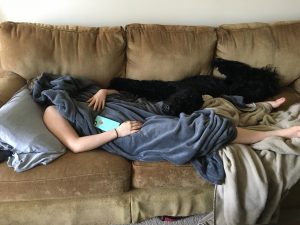Being in school while managing chronic illness is like navigating a minefield. You never know when symptoms are going to hit or the impact it will make on your education. When I was really flaring I would leave for class not knowing if I would make it through the lecture and wondering if I had the strength to get back home. I was so high on medication I could barely remember my own name, much less new information. I was a zombie, just trying to piece together some semblance of a life.
Even a year into remission, my stamina is still pretty low. I have to sleep at least 8-9 hours every night (no exceptions), stay hydrated (AND NEVER HAVE CAFFIENE), exercise the exact right amount (I shoot for at least 30 minutes a day), and eat three balanced meals (that I usually make myself). Some days I wake up and I can’t leave my apartment. I could feel great in the morning and be certain my body is trying to kill me by the afternoon.
My life does not fit into the “typical student” lifestyle you picture of all-nighters and coffee addiction. However, myself, and many people with autoimmune disorders, are taking on the world of higher education. It may not be easy, but it is possible. No matter if you are in middle school, high school, college, or beyond, chronic illness complicates your schooling, but there is a way to make navigating the minefield a little easier.

Here are just a few tips I have used to make it through school with a chronic illness:
Advocate for Yourself.
You have a diagnosis for a reason. Tell your professors/teachers about your autoimmune disorder after the first class. Let them know how serious your disease can be and how quickly it can effect you. If you have to miss a meeting with your classmates, let them know why. When I was first diagnosed I was embarrassed about my IBD (because of all the glamorous symptoms) and tried to push through without telling anyone what was going on behind the scenes. This only caused confusion and stress, so I went ahead and told the people around me about my Ulcerative Colitis.
Instead of wondering why I was constantly distracted or MIA, they reached out to support me. My classmates often give me notes when I miss class and share their study guides when I am too tired to create my own. I was able to graduate from undergrad because two of my professors went to the administration and asked that I participate in their classes online when I told them I would be out of school for at least 6 weeks.
At the beginning of each semester I walk up to my professors after class and give the same quick statement.
Hi, I think that you have heard something from Disability Services about me (they send out an email every semester to my professors). I just want you to know that I have an autoimmune disorder called Ulcerative Colitis. This basically means my body attacks itself, and I have a difficult time digesting food. I am on medication and currently in remission so I do not forsee this having a huge impact on my classes, but I like to be upfront and let you know. Usually I am fine, but some days I wake up and I just can’t get out of bed. This can happen extremely quickly. I also am on strong medication with a lot of side effects. Sometimes I react really well and sometimes I experience fatigue, migraines, pain, and nausea. If I have to miss class, I will make sure to contact you as soon as possible. Can you think of anything ahead of time I can do to make up class if I miss it?
This usually sparks a great conversation with my professor about accommodations I may need or how I compensate when I am feeling ill. So far, my professors have been nothing but understanding. This year alone, I have had a professor give me an entire lecture I missed due to a Remicade migraine, another professor offer to let me take my final in a room alone in case I got sick or needed to run to the restroom, and yet another professor offer to work with me individually when I caught a bug (lowered immune system) and was forced to miss a lab. Advocating for yourself really works. It helps people better understand your disease, and I have found when people understand they are always willing to offer a helping hand.
Tell Them You are Sick
- Send an email
Teaching is a hard profession and a lot of work goes into each lecture. Make sure your professor knows you take your schoolwork seriously by letting he or she know you will be absent with an email AS SOON AS YOU KNOW YOU ARE SICK. It looks professional, it makes for easy communication, and it allows all information to be written down in case you need to look at the response later. State you are sorry for the inconvenience, give a brief description of what happened (caught a bug, migraine from medication, had a flare), and ask what you can do to make up the class.
- Text if Possible
I do not have the numbers of most of my professors, but I do have the phone number of those I work with in clinic. Most people have their phones on them 24 hours a day. It is a quick and easy way to follow-up an email without getting out of bed. Once again, make sure the tone is professional. I usually just say hello, sorry for texting you last minute, I sent an email but I wanted to make sure you knew, I have x today and won’t be making it to clinic/class.
- Ask Another Student to Tell
This is extremely helpful if you get sick right before class. Even if you sent an email, many professors do not have the time to check their emails throughout the day. Having someone say something directly to the professor ensures that they get the message.Usually I just leave this one as will you let Professor X know I’m sick today? Your professor has enough time to get the gist when he or she reads your email later.
- Ask What you Can do to Catch Up
Always ask what you can do to catch up on the lecture you missed. Not only does it show you take your classwork seriously and realize classes are important, it is usually this statement that gets a professor to meet with me one on one or give me additional information that will be useful.
Learn to Let Go
I am a classic nerd, and I have always worked like crazy to make straight A’s. After my diagnosis I quickly learned that it wasn’t always possible for me to make straight A’s anymore. I couldn’t stay up all night studying for a huge test. When I feel sick, I can’t focus. My goal has switched to learning the important information and passing my classes. I may not make straight A’s and that is ok. I had to learn to Let It Go… Let It Go…. Yes, I love Frozen. I make no apologies.

Use Disability Services
This is the greatest resource you have in the educational world. I have found most professors are great at working with you, but every once in a while you need someone in your corner. Disability services (or whatever it is called at your school) is there to help you and advocate for you when advocating for yourself is not enough. I also found just having documentation through this office helped my professors take my autoimmune disorder more seriously.
Take a Break When You Need It
My favorite study tool is a quick nap. I know it sounds crazy, but I have learned I can only study so long before my mind checks out. After that point I know I won’t remember anything. I can take a 15 minute break or a quick 30 minute nap and feel refreshed enough to study a little longer. Breaks are crucial for me and help me perform much better.

Do Your Make-Up Work
No matter what you missed, make sure you know the material. I have a friend in class who records all of our lectures for a professor. I will re-listen to these, thumb through the book, and make sure I understand the material before the next lecture. If I miss lab I make sure to meet up with my professor to make sure I can grasp whatever I missed.
Do Your Work Ahead of Time
I learned this tip the hard way. We all know that the beginning of each semester moves a lot slower than the end. I tend to feel better when life is moving slower, and in the past I have gone ahead and worked on projects, made notecards for midterms, or tried to look ahead. This semester I did not do these things and faced the consequences during finals. I had a little mini-flare and still had a mountain of work. It was AWFUL. Work ahead, get it done, and you will feel much better towards the end of the year. This also helps a lot in group projects. Working ahead ensures you won’t leave your classmates hanging if you feel poorly.
Making it through school with a chronic illness may be difficult, but that does not mean it is impossible. I hope these tips help you to better navigate the minefield and make it easier to obtain success in the educational world.
